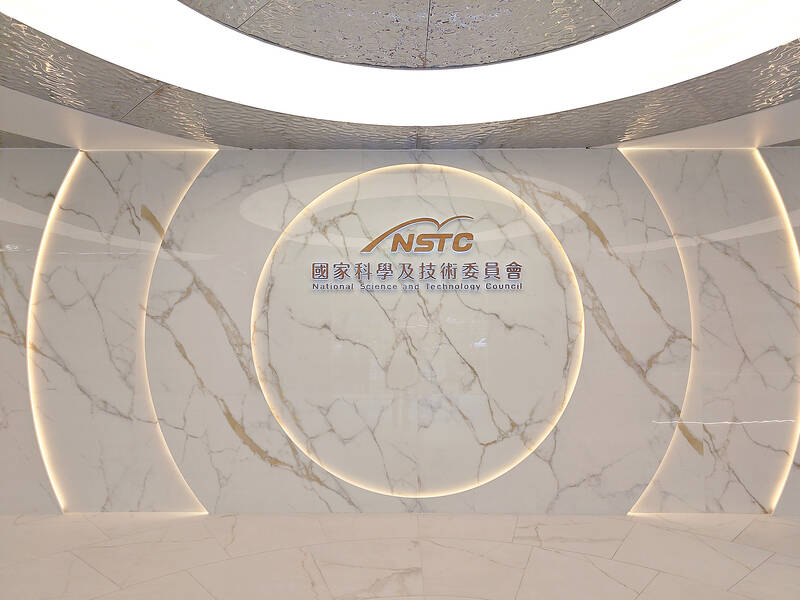The National Science and Technology Council (NSTC) on Wednesday launched an action plan to develop Taiwan’s gerontechnology industry, which it said is designed to meet the needs of a super-aged society.
With 21 percent of Taiwan’s population expected to be aged 65 or older by 2026, the government since March last year has been meeting with experts from agencies, industries, academia and the medical field to discuss the issue and planned response measures.
Gerontechnology — an emerging field that uses technology to meet the care and quality-of-life needs of elderly people — has been guiding many countries’ responses to aging societies, said Lin Ming-jen (林明仁), deputy executive secretary of the council’s Office of Science and Technology Policy and a professor of economics at National Taiwan University.

Photo: Wu Po-hsuan, Taipei Times
Taiwan’s action plan for the gerontechnology industry is a joint undertaking of the Ministry of Economic Affairs, the Ministry of Health and Welfare, the Ministry of Digital Affairs, the Ministry of Education, the Ministry of the Interior, the Ministry of Culture and the Council of Indigenous Peoples, NSTC Minister Wu Tsung-tsong (吳政忠) told a launch event on Wednesday.
The plan would attend to the needs of elderly people and stimulate the development of related industries in Taiwan, as smart and other new technologies are expected to be deployed, with the government serving as a platform, Wu said.
This would help empower elderly people and enhance their quality of life, including participation in social activities, healthcare and their caregivers’ needs, he said.
Minister Without Portfolio Lin Wan-i (林萬億) said that about 21 percent of Taiwan’s population would be 65 or older by 2026, with the figure reaching 28 percent in 2036, making the country an “ultra-aged society,” a title that only Japan has.
“The silver economy is not only about long-term care, which is only needed by 13.3 percent of elderly people [in Taiwan]; we also want to make use of new technologies to help the other 86.7 percent live independently with good quality of life,” Lin Wan-i said.
“Digital empowerment, for instance, is one of the important aspects regarding how elderly people can remain connected to society,” he said, adding that narrowing the inter-generational digital gap is crucial to social inclusion.
“What elderly people need is more than a bigger keyboard on their mobile phones,” said Liu Tsu-hwie (劉祖惠), a director at the Office of Science and Technology Policy. “In terms of digital empowerment, our job is to help mediate between industry — where young people are the main developers — and the needs of elderly people.”
Another aim is to enhance the efficacy of caregivers with smart technologies and improve the quality of life for elderly people by localizing the care industry and expanding the care network, Lin Min-jen said.
Policies to respond to an aged society’s needs proposed in the US, Japan and South Korea are based on the idea of changing the perspective from treating elderly people as passive recipients of care to empowering them with the help of new technologies, he said.
A 2019 US report titled Emerging Technologies to Support an Aging Population identifies a range of functional capabilities and aspects that emerging technologies have the potential to improve, including communications and social connectivity, mobility, access to healthcare, cognition, and reducing caregivers’ emotional and economic stress, he said.
There were about 760 million people aged 65 or older in the world in 2021 and the number is expected to reach 1.6 billion by 2050, he said.
The old-age dependency ratio — defined as the number of people aged 65 or older per 100 people aged 20 to 64 — would rise to 1:3.8 from 2021’s 1:6.7, Lin Min-jen said.
This means that the market for long-term care and for helping elderly people would grow immensely, he added.

The inspection equipment and data transmission system for new robotic dogs that Taipei is planning to use for sidewalk patrols were developed by a Taiwanese company, the city’s New Construction Office said today, dismissing concerns that the China-made robots could pose a security risk. The city is bringing in smart robotic dogs to help with sidewalk inspections, Taipei Deputy Mayor Lee Ssu-chuan (李四川) said on Facebook. Equipped with a panoramic surveillance system, the robots would be able to automatically flag problems and easily navigate narrow sidewalks, making inspections faster and more accurate, Lee said. By collecting more accurate data, they would help Taipei

TAKING STOCK: The USMC is rebuilding a once-abandoned airfield in Palau to support large-scale ground operations as China’s missile range grows, Naval News reported The US Marine Corps (USMC) is considering new sites for stockpiling equipment in the West Pacific to harden military supply chains and enhance mobility across the Indo-Pacific region, US-based Naval News reported on Saturday. The proposed sites in Palau — one of Taiwan’s diplomatic allies — and Australia would enable a “rapid standup of stored equipment within a year” of the program’s approval, the report said, citing documents published by the USMC last month. In Palau, the service is rebuilding a formerly abandoned World War II-era airfield and establishing ancillary structures to support large-scale ground operations “as China’s missile range and magazine

A 72-year-old man in Kaohsiung was sentenced to 40 days in jail after he was found having sex with a 67-year-old woman under a slide in a public park on Sunday afternoon. At 3pm on Sunday, a mother surnamed Liang (梁) was with her child at a neighborhood park when they found the man, surnamed Tsai (蔡), and woman, surnamed Huang (黃), underneath the slide. Liang took her child away from the scene, took photographs of the two and called the police, who arrived and arrested the couple. During questioning, Tsai told police that he had met Huang that day and offered to

BETTER SERVICE QUALITY: From Nov. 10, tickets with reserved seats would only be valid for the date, train and route specified on the ticket, THSRC said Starting on Nov. 10, high-speed rail passengers with reserved seats would be required to exchange their tickets to board an earlier train. Passengers with reserved seats on a specific train are currently allowed to board earlier trains on the same day and sit in non-reserved cars, but as this is happening increasingly often, and affecting quality of travel and ticket sales, Taiwan High-Speed Rail Corp (THSRC) announced that it would be canceling the policy on Nov. 10. It is one of several new measures launched by THSRC chairman Shih Che (史哲) to improve the quality of service, it said. The company also said